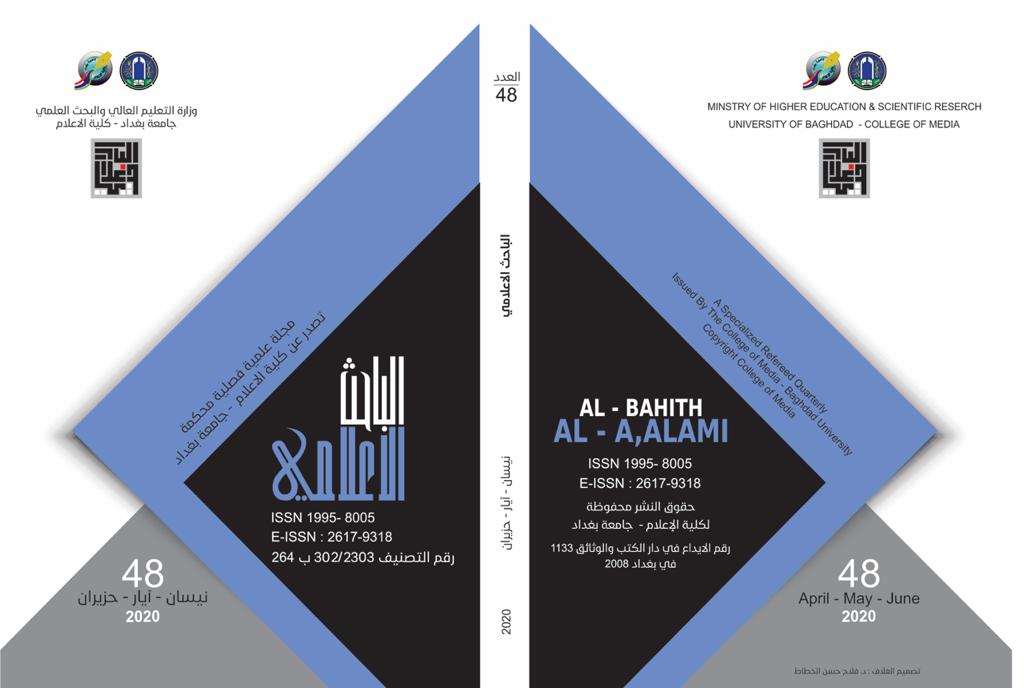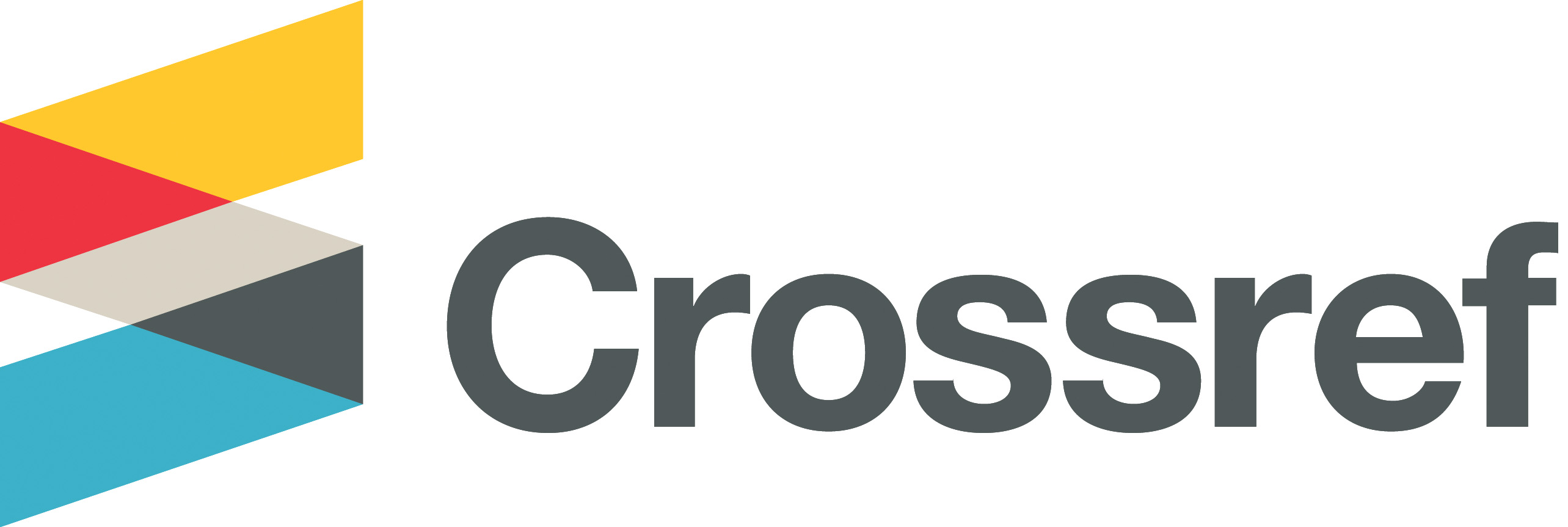THE COMMUNICATOR AND THE FACTORS INFLUENCING HIS JOB IN UNIVERSITY PRESS
A survey study of the managers of administrative departments of public relations and media at Iraqi Universities
DOI:
https://doi.org/10.33282/abaa.v12i48.582Keywords:
- Communicator -University press - Universities -communicative skills - Influencing factors - Influencing factorsAbstract
The research problem lies in the lack of accurate scientific perceptions concerning the reality of the communicator and the factors influencing his job. The research is aimed at introducing the communicator in the university press, clarifying the obstacles facing him, and uncovering the level of his job satisfaction and his visions of developing his work.
The researcher adopted the survey method in the collection, analysis, and interpretation of the data using a questionnaire.
A set of results and conclusions has been reached, most importantly are:
*The communicator performs multiple missions including writing, editing, and collecting information, in spite of the job description is assigned to him by the newspaper. In turn, this is reflected negatively on his productivity taking into account performing missions outside of his basic job in media, besides performing academic missions as for those holding post-graduate degrees.
*The communicator does not have the freedom to determine the design and content of his newspaper due to several factors from which are (senior management of the foundation), (targeted audience), and (costs of the newspaper production).
*The success of the communicator can be achieved by continuous administrative support to his communicative skills which reflect his persuasive abilities, and it is the credibility derived from his expertise and self-confidence that can make him influence his audience.
*Poor attention given by senior management to the newspaper and scarcity of material and moral incentives has mostly affected the job of the communicator negatively combined with the presence of obstacles topped by insufficient specialized staff and scarcity of training and development especially outside of the country.
*A decline in job satisfaction and audience satisfaction has been found due to the communicator needs being unmet, and scarcity of material and moral incentives.
Downloads
References
خالد ابراهيم عبد العزيز. (2018). مصادر ضغوط العمل لدى القائم بالاتصال في العلاقات العامة، الباحث الاعلامي، كلية الاعلام، جامعة بغداد. العدد:42.
سلام احمد عبده. (2011). الرضا الوظيفى لدى اخصائى الإعلام التربوي وعلاقته بالأداء المهني. المجلة المصرية لبحوث الراي العام، كلية الاعلام، جامعة القاهرة، العدد:3.
سوزان القليني. (2015). مناهج البحث العلمى. القاهرة: دار النهضة العربية.
صباح بهنام عبدالكريم. الصحافة الطلابية فى العراق (رسالة ماجستير). 1979. كلية الإعلام، جامعة القاهرة.
عادل فهمى البيومى. (2002). محددات الرضا الوظيفى للعاملين فى القنوات الفضائية المصرية. المجلة المصرية لبحوث الإعلام، كلية الاعلام جامعة القاهرة، العدد: 10.
عماد حسن مكاوى. (2009). نظريات الإعلام. القاهرة: الدار العربية للنشر والتوزيع.
غازى زين عوض الله، و آخرون آخرون آخرون. (2003). الصحافة الجامعية نشأتها وتطورها. القاهرة: دار نصر المحروسة.
ليلى عبدالمجيد. (1997). العوامل المؤثرة على تحرير الصحف الجامعية. المجلة المصرية لبحوث الاعلام، كلية الاعلام جامعة القاهرة، العدد:2.
محمد بن علي السويد. (2009). الصحافة الجامعية في المملكة العربية السعودية، المملكة العربية السعودية. جامعة الامام محمد بن سعود الاسلامية.
محمد سعد أحمد إبراهيم. (2000). الإتجاهات الحديثة فى دراسات القائم بلاتصال. المجلة المصرية لبحوث الراي العام، كلية الإعلام، جامعة القاهرة، العدد: 4.
محمد عبدالحميد. (2012). التربية الإعلامية والوعى بالأداء الإعلامى. القاهرة: عام الكتب.
محمد عبدالحميد. (2012). نظريات الإعلام واتجاهات التاثير. القاهرة: عالم الكتب.
منى الحديدى، و درويش شريف اللبان. (2009). فنون الإتصال والإعلام المتخصص. القاهرة: الدار المصرية اللبنانية.
موقع وزارة التعليم العالى والبحث العلمى الالكتروني. (2019). www.mohesr.go.iq.
References
1- Hussain. Shafeeq. (2010), Making journalists, Cairo: Dar Fikr for printing, distribution, and publishing.
2- Khalid Ibrahim Abdelaziz (2018), Work Street sourse of the Communicator in Public relation, Al-bahith Al-a, alami Journal, College of Media, University of Baghdad, issue: 42.
3- Salam. Ahmed. Abdu, (2011), Job satisfaction and their effect on professional performance for specialists in educational media, Egyptian Journal for public opinion, Faculty of Media, University of Cairo, issue: 3.
4- Suzan. Alqulaini, (2015), methodologies of scientific research, Cairo: Dar Alnahdha Alarabia.
5- Sabah. Bahnam. Abdulkareem, Student Journalism in Iraq, an M.A. thesis, (1979), Faculty of Media, University of Cairo.
6- Adil. Fahmi. Albaumi, (2002), Determinants of Job satisfaction for the staff of Egyptian satellite chnnels, Faculty of Media, University of Cairo, issue: 10.
7- Imad. Hassan. Makkawi, (2009), Theories of media, Cairo: Aldar Alarabia for publishing and distribution.
8- Awadh Allah et. al, (2003), University Press, Evolution and development, Cairo: Dar Nasr Akmahrusa.
9- Layla. Abdulmajeed, (1997), Influencing factors on editing of university newspapers, Egyptian Journal of media studies, Faculty of Media, University of Cairo, issue: 2.
10- Mohammad bin Ali al-Sweden(2009), University Press in Saudi Arabia, al- Riyadh, Imam Mohammed Bin Saud Islamic University.
11- Mohammad. Saad. Ahmed, (2000), Modern trends in communicator studies, Egyptian Journal for public opinion, Faculty of Media, University of Cairo, issue: 4.
12- Mohammad. Abdulhammed, (2012), Media Literacy and awareness of media performance, Cairo: Alam Alkutub.
13- Mohammad. Abdulhammed, (2012), Media theories and trends of influence, Cairo: Alam Alkutub.
14- Muna. Alhadeedi& Darweesh. Alaban, (2009), The Arts of Specialized Communication and Media, Cairo: Aldar Almasriya Allubnaniya.
15- The Website of the Ministry of Higher Education and Scientific Research, (2019), www.mohesr.go.iq.
Downloads
Key Dates
Published
Issue
Section
License
Copyright (c) 2020 Author

This work is licensed under a Creative Commons Attribution 4.0 International License.
Authors retain copyright and grant the journal right of first publication with the work simultaneously licensed under a Creative Commons Attribution License (CC BY 4.0) that allows sharing the work with recognition of authorship and initial publication in ABBA journal.


















